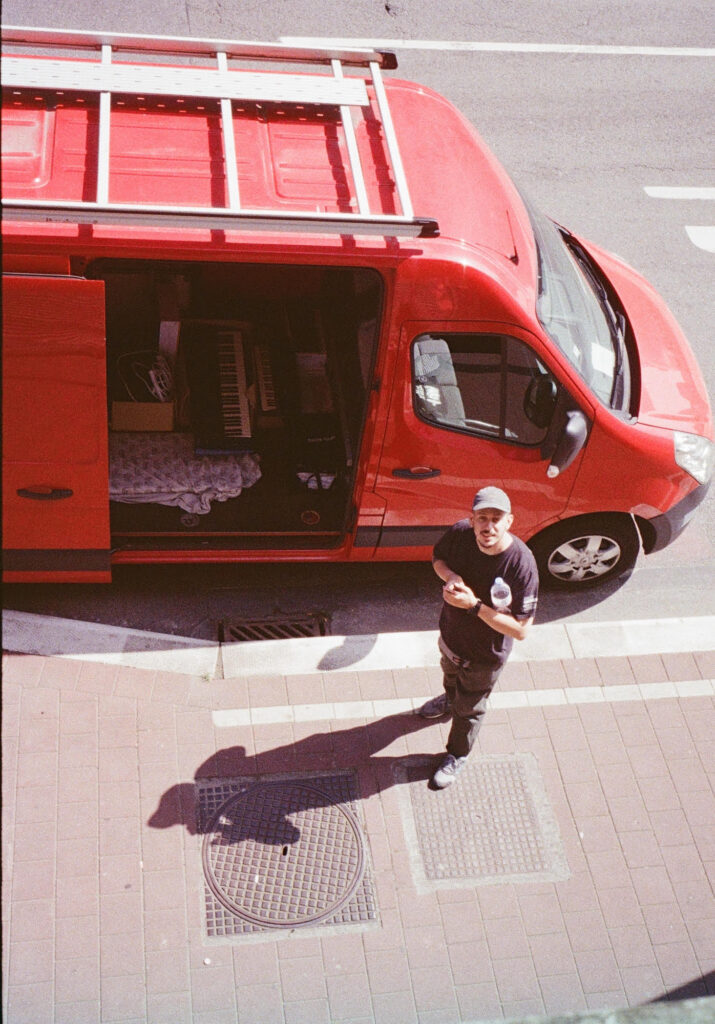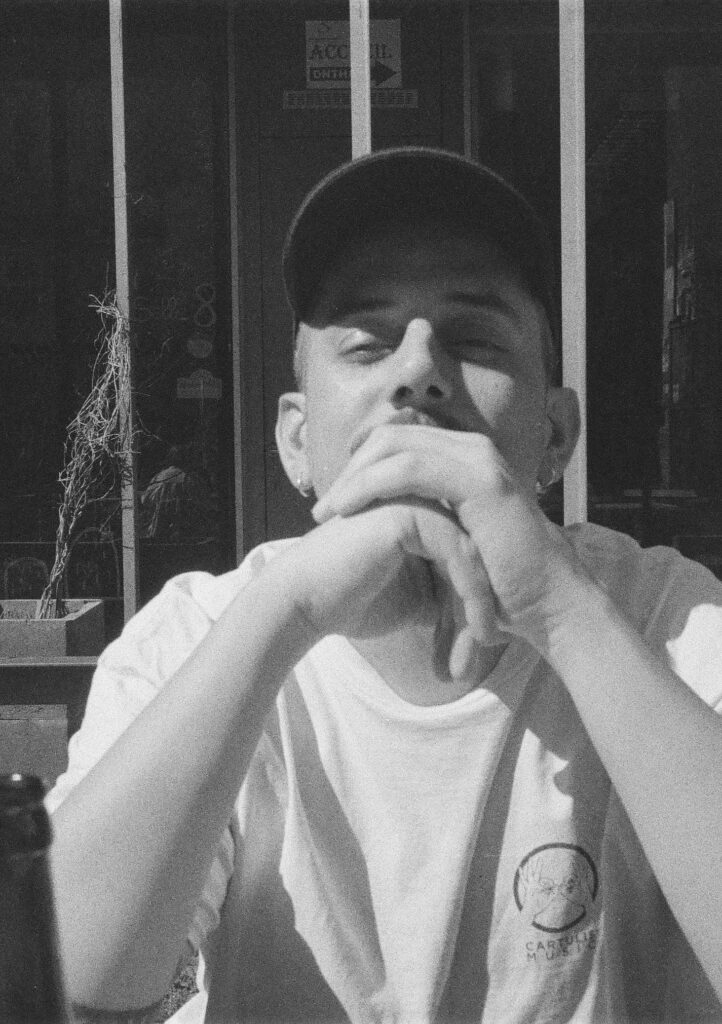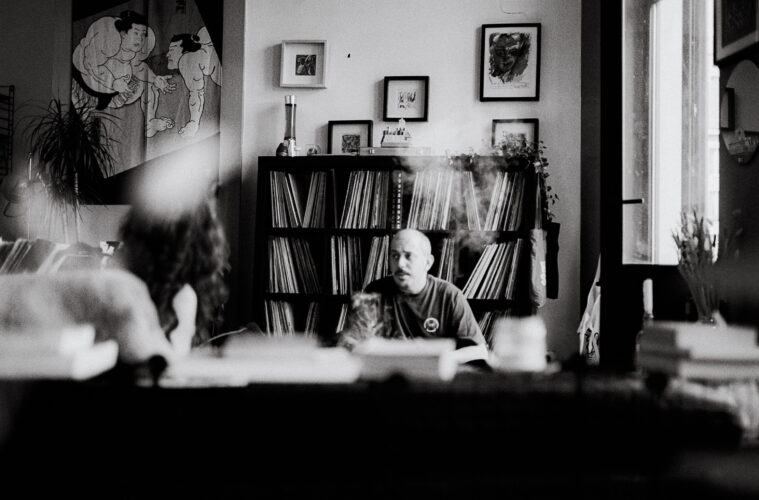Unai Trotti a Transumare Fest sarà uno degli headliner di una ricchissima e varia line up, che conta anche artisti come DVS1, Venerus e 99 Posse. Abbiamo fatto due chiacchiere con l’ideatore di Cartulis, che ci ha raccontato la costruzione paziente e autentica di un’identità artistica radicata nella comunità, nella ricerca musicale e nella coerenza personale.
Aggiungere alla line up di Transumare Unai Trotti è una scelta di direzione artistica che parla chiaro: restare fedeli alla musica come esperienza autentica, radicata nel suono e nelle relazioni, nell’ascolto comunitario che ne nasce dall’energia che si crea di fronte a un dj booth, a un palco.
Con una traiettoria costruita nel tempo, senza scorciatoie né maschere, Unai Trotti rappresenta una visione profonda della club culture: quella in cui le notti non sono solo momenti di fuga, ma luoghi di formazione identitaria, dove ci si riconosce e ci si trasforma in un unico movimento comune, unito ed equilibrato dalla passione per la musica e dalla necessità di sentirsi parte di qualcosa.
Transumare, per quanto un evento in riva al mare possa sembrare un po’ distante come concetto dalla scena club, è invece proprio questo. L’essenza di un flusso di passione per la musica che attraversa le persone che sono lì per appartenere, almeno per qualche notte, a una collettività.
Questa rappresentazione astratta dell’ascolto comunitario, si è sposata fin da subito bene con quella del fondatore del progetto Cartulis, uno dei party più amati e seguiti della scena elettronica odierna. Based in Londra, non è solo DJ, ma anche curatore di label che esplorano ogni piega del suono e produttore dal tocco sensibile.
Per questo crediamo che il nome di Unai Trotti a Transumare sia qualcosa di più di solo un artista in line up: è un invito a rallentare (con la mente, si intende, il suo set vi farà muovere, garantito!) ad ascoltare col cuore e con i polmoni, a ritrovare un senso comune nel gesto, mai banale, del “sentire la musica”.
In attesa di assaporare quello che sarà il DJ set di venerdì 22 agosto di Unai Trotti a Transumare, gli abbiamo fatto qualche domanda, le cui risposte, siamo sicuri, non faranno altro che accendere ancora di più la vostra curiosità.
La musica è un viaggio personale e artistico. Qual è stato il momento in cui hai capito che l’elettronica sarebbe diventata il centro della tua vita?
Non credo ci sia stato un momento preciso, piuttosto una serie di esperienze intense e ravvicinate che mi hanno trascinato sempre più a fondo.
Uscire nei club da giovanissimo, scoprire la cultura del vinile, iniziare a costruire una comunità intorno alla musica… Tutto questo mi ha fatto capire che non ero più solo un ascoltatore. Ho iniziato a organizzare gli eventi Cartulis nel 2009 e, col tempo, mi sono ritrovato a fare party, scavare tra i dischi, passare ore in studio collaborando con artisti come Quinn Whalley. È stato allora che ho realizzato che non si trattava più di un hobby: era diventata la mia vita.
Le tue radici culturali hanno sicuramente lasciato un’impronta nel tuo percorso artistico. In che modo si riflettono nel tuo approccio alla musica e alle produzioni?
Il mio sound è stato sicuramente plasmato dagli anni a Londra. Partecipare a party underground e scoprire la cultura rave ha avuto un impatto enorme sul mio modo di ascoltare e pensare la musica. Il mio approccio è sempre stato quello di cercare tracce che mi risuonano davvero dentro, ma anche di spingermi a mettere la musica in contesti nuovi, testarla in situazioni diverse. Mi piace esplorare in studio, restando aperto e curioso.
Il progetto DJ Mostoles si muove su paesaggi sonori più downtempo e orientati al trip-hop. Cosa ti ha spinto a intraprendere questo percorso parallelo?
DJ Mostoles è nato dal bisogno di esprimere un altro lato di me: qualcosa di più lento, guidato dall’umore, con un ritmo diverso. Ha preso forma nei momenti di quiete della pandemia, quando non avevo voglia di produrre musica per la pista.
In quel periodo ascoltavo tanto hip hop, campionavo dischi e lasciavo fluire le idee in modo più introspettivo. È diventato uno spazio dove raccontare un altro tipo di storie.

Oggi Cartulis è uno dei party più seguiti e amati della scena elettronica internazionale. Raccontaci com’è nato il progetto, che aspettative avevi all’inizio e cosa rappresenta per te oggi.
Cartulis è nato nel 2009 come una piccola festa tra amici a East London, in realtà per il mio compleanno. Nessuna grande aspettativa: solo uno spazio dove mettere dischi e godersi la musica insieme. Era tutto molto sincero, grezzo, intimo.
Con il tempo il progetto è cresciuto in modo naturale, passo dopo passo, ma abbiamo sempre cercato di mantenere viva quell’energia iniziale. Oggi Cartulis è una famiglia. È una casa creativa, una piattaforma, e il riflesso delle persone e della musica che ci ispirano.
Le tue etichette esplorano direzioni musicali piuttosto diverse. Cosa guida le scelte per ognuna di esse?
Ogni label ha una propria identità. Cartulis è l’etichetta madre, da cui è partito tutto. Durante il periodo del Covid ho avuto più tempo per concentrarmi sul progetto discografico, ed è lì che è nata l’idea di creare delle sub-label: ALT e DEL.
Il concept nasce dal codice catalogo di Cartulis, “CRTL”, che molti confondono con “CTRL”. Mi ha fatto pensare alla combinazione CTRL+ALT+DEL, il comando per resettare o riavviare.
Cartulis è dedicata a suoni senza tempo, non legati a un genere preciso, molto connessa agli eventi. L’artwork è curato da mio padre, Gerardo Trotti, il che aggiunge un tocco personale. ALT è più orientata al clubbing, ma è ancora in evoluzione.
DEL invece è il lato sperimentale: musica d’ascolto, downtempo, ambient o tracce più astratte. Ogni label rappresenta un angolo diverso del mio universo musicale.
Questa estate sarai tra gli ospiti di Transumare a Roseto degli Abruzzi. Cosa ti aspetti dal festival e come sei entrato in contatto con loro?
Ho scoperto Transumare grazie al mio amico Nicky Macha, che oltre a essere un DJ incredibile è anche una persona di cui mi fido molto musicalmente.
Mi ha raccontato di come il festival unisce musica, natura e comunità in modo autentico, e questa cosa mi ha subito colpito. È proprio l’ambiente in cui amo suonare: persone presenti, aperte, connesse tra loro. Non vedo l’ora di condividere musica in un contesto così. Sono quelle esperienze che ti restano dentro.
La tua esperienza nella club culture attraversa diversi decenni. Guardando alla scena elettronica contemporanea, che cambiamenti hai osservato e come pensi evolverà nei prossimi anni?
La scena è cresciuta tantissimo in termini di visibilità, ma anche di complessità. Ora c’è più accesso, più artisti, più piattaforme, ma anche più “rumore”. Uno dei cambiamenti più evidenti riguarda il modo in cui oggi si consuma e percepisce la musica.
I social hanno un ruolo enorme, e onestamente credo che in gran parte sia un’influenza negativa. Like e commenti non riflettono il valore artistico, spesso riflettono solo hype o reach a pagamento. E purtroppo tanti promoter o venue si basano proprio su questi numeri per fare booking.
Ma c’è anche un movimento forte che torna a ritmi più lenti, a modi di vivere la musica più intenzionali: comprare vinili, costruire scene locali, restare nell’underground.
E vedo emergere una nuova generazione di produttori incredibili. Credo che il futuro sia lì, nelle radici: restare con i piedi per terra e continuare a evolversi creativamente.
La tua versatilità, tra DJing, produzione e direzione artistica, ti rende una figura chiave nel panorama elettronico. Come riesci a bilanciare questi ruoli mantenendo un’identità artistica così forte?
È sicuramente un gioco di equilibrio, e sto ancora imparando a gestirlo. Si tratta di trovare tempo per ciò che conta davvero e fare le cose con cura.
Ogni ruolo alimenta gli altri: il DJing mi tiene vicino al dancefloor e alla ricerca musicale continua, produrre mi dà spazio per riflettere, mentre curare eventi o gestire le label mi spinge a pensare in modo più ampio.
Cerco sempre di essere onesto con me stesso e tornare al nucleo: passione, curiosità, e la voglia di costruire qualcosa che abbia senso. È questo che tiene insieme tutto. Per me, è tutto nella musica. È da lì che parte e finisce ogni cosa.

Scopri la line up completa di Transumare Fest e acquista i biglietti cliccando qui
ENGLISH VERSION
Unai Trotti at Transumare: inhabiting music as a human ecosystem
Unai Trotti at Transumare Fest will be one of the headliners of a rich and eclectic line-up, featuring names like DVS1, Venerus, and 99 Posse. We had a chat with the mind behind Cartulis, who told us about the patient and authentic journey of building an artistic identity rooted in community, musical exploration, and personal integrity.
Bringing Unai Trotti to the Transumare line-up is an artistic direction that speaks loud and clear: staying true to music as an authentic experience, deeply rooted in sound and relationships, in that communal act of listening that emerges from the energy created in front of a DJ booth or a stage.
With a trajectory shaped over time, free from shortcuts or masks, Unai Trotti embodies a deep vision of club culture, one where the night is not just a place for escape, but a space for identity formation. A place to recognize oneself and transform through a shared, collective movement balanced by passion for music and the human need to feel part of something. And as much as a seaside event may seem far from the traditional idea of the club scene, Transumare is exactly that: the essence of a musical flow that runs through people who, for a few nights at least, want to belong.
This abstract yet vivid idea of communal listening aligns seamlessly with the ethos of the Cartulis founder. Based in London, Trotti is not only a DJ but also a label curator exploring every fold of sound, and a producer with a sensitive, distinctive touch. That’s why we believe his name on the Transumare line-up represents more than just another artist: it’s an invitation to slow down (mentally, of course – his set will have you moving, no doubt!), to listen with heart and breath, and to rediscover a shared meaning in the beautifully simple act of feeling music.
As we eagerly await Unai Trotti’s DJ set on Friday, August 22nd at Transumare, we asked him a few questions… and trust us, his answers will only deepen your curiosity.
Music is both a personal and artistic journey. What was the moment you realized that electronic music would become the center of your life?
I don’t think there was one single defining moment, it was more a series of small, intense experiences that gradually pulled me in deeper. Going out to clubs in my early years, discovering vinyl culture, and slowly building a community around music… all of that made me realise I wasn’t just a listener anymore. I started doing Cartulis events back in 2009, and eventually found myself organising parties, digging for records, and spending time in the studio collaborating with artists like Quinn Whalley. That’s when I understood this wasn’t just a hobby anymore, it had become my life.
Your cultural roots have undoubtedly left their mark on your artistic path. How are they reflected in your approach to music and your productions?
My sound was definitely shaped by my time in London. Going to underground parties and discovering rave culture had a big influence on how I listen and think about music. My approach is always about finding tracks that truly resonate with me, but also about putting music into new situations, testing it in different contexts. I like to explore in the studio, staying open and curious.
The DJ Mostoles project explores soundscapes oriented towards a more downtempo and trip-hop vision. What inspired you to embark on this parallel project?
DJ Mostoles was born out of a need to express another side of myself, something slower, more mood-driven, with a different rhythm. It really took shape during the quiet moments of the pandemic, when I didn’t feel like making music for the dance floor. I was listening to a lot of hip hop, sampling records, and letting things flow in a more introspective way. It became a space for a different kind of storytelling.
Today, Cartulis is one of the most followed and beloved parties on the international electronic scene. Tell us how the project was born, what expectations you had when you founded it, and what it represents for you today.
Cartulis started in 2009 as a small gathering for close friends in East London, actually for my birthday. We had no big expectations, just a space to play records and enjoy music together. It was honest, raw, and intimate. Over time, it grew naturally, step by step, but we’ve always tried to keep that original energy alive. Today, Cartulis feels like family. It’s a creative home, a platform, and a reflection of the people and the music that inspire us.
Your labels explore quite different musical directions. What inspires your choices for each of them?
Each label has its own identity. Cartulis is the parent label, it’s where everything started. During the Covid period, I had more time to focus on the label, and that’s when the idea of creating sub-labels came up: ALT and DEL. The concept came from the name Cartulis having the catalog code CRTL, which many confuse with CTRL. It made me think of CTRL+ALT+DEL, a way to reset or reboot.
Cartulis focuses on timeless sounds, not tied to any one genre, and is closely linked to the events. The artwork is done by my father, Gerardo Trotti, which adds a personal touch.
ALT is more club-oriented, but still evolving.
DEL is dedicated to experimental music and listening experiences—downtempo, ambient, or more abstract pieces. Each label reflects a different corner of my musical universe.
This summer, you will be among the guests at Transumare in Roseto degli Abruzzi. Tell us what you expect from the festival and how you got involved.
I first heard about Transumare through my friend Nicky Macha, who’s not only a fantastic DJ but someone I really trust musically. He told me how the festival blends music, nature, and community in a sincere way, and that really resonated with me. That’s the kind of environment I love playing in: where people are present, open, and connected. I’m looking forward to sharing music in that kind of space. These are the experiences that stay with you.
Your experience in the world of club culture spans decades. Looking at the contemporary electronic scene, what changes have you observed, and how do you think it will evolve in the coming years?
The scene has grown a lot in terms of visibility, but also in complexity. There’s more access now, more artists, more platforms – but also more noise. One big change is how music is consumed and perceived today. Social media plays a huge role, and honestly, I think it’s mostly for the worse. Likes or comments don’t reflect artistic value, sometimes they just reflect hype or paid reach. And unfortunately, many promoters or venues focus on these numbers when booking artists.
But on the flip side, there’s a strong movement going back to slower, more intentional ways of experiencing music, buying vinyl, building local scenes, staying underground. And I feel like a new generation of amazing producers is coming up. I believe the future lies in those roots—staying grounded while continuing to evolve creatively.
Your versatility, switching between your roles as a DJ, producer, and art director, makes you a key figure in the electronic music landscape. How do you manage to balance these diverse responsibilities while maintaining such a strong artistic identity?
It’s definitely a balancing act, and something I’m still learning how to manage. It’s about finding time for what truly matters and doing things properly. Each role feeds into the others, DJing keeps me close to the crowd and constantly digging, producing gives me space to reflect, and curating events or running labels challenges me to think more broadly.
I try to stay honest with myself, always returning to the core: passion, curiosity, and the desire to build something meaningful. That’s what holds it all together. For me, it’s all about the music. That’s where everything starts and ends.
Check out the full Transumare Fest lineup and grab tickets by clicking here

